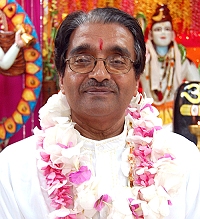Paramacharya of SWAHA, Pt. Hardeo Persad
Extracted from an interview on 90.5 FM on the four virtues.
Cleanliness (soucham) is one of four virtues we are asked to cultivate, along with truth (satyam), compassion (dayaa) and charity (daan). Cleanliness can be categorised as both internal and external. Since ancient times, we have been taught that cleanliness is essential. It is said that cleanliness is next to Godliness. Also, in our present situation of COVID-19, people are advised to wash their hands frequently as personal hygiene is necessary to protect oneself.
Sanatan Dharma teaches that everything should be clean, especially when preparing for and performing pujas. When preparing for puja, the ingredients are washed: the flowers, leaves and rice. Even the altar on which we perform the puja, the baydi, has to be cleansed. Since ancient times, people have been leepaying the baydi with gobar (fresh cow dung). Nowadays many people scoff at this practice; with the passing of time, we have lost the true meaning that underlies this ritual. Gobar is used because it has been proven to possess antiseptic qualities, that is, it destroys germs in its environment.
However, it must be noted that the type of gobar used to cleanse the baydi is important. Scriptures emphasise that batcha gobar, the young cow’s waste, must be used, not that of the adult cow. The quality of the gobar is also significant; it must be fresh, meaning that it should not be more than an hour and a half old. The reason is that the heifer’s intestines are short and it mostly eats grass, so that the digested food does not remain long enough in the intestines to putrefy. Long ago, people raised cows in their yards, so it was not difficult to procure gobar. This is not the case nowadays, and when gobar is obtained that is more than one and a half hours old, it has already begun the putrefecation process and is impure. Furthermore, today cows are fed manufactured cowfeed, which is sometimes mixed with animal products, including cows, and the gobar produced is then impure. If the gobar is older than one and a half hours or impure due to some other reason, it should not be used. Purification and cleanliness are the underlying principles in performing puja. The question, then, is what is an appropriate alternative to using gobar to cleanse the baydi in modern circumstances when we cannot obtain the fresh gobar of a young cow? The turmeric root, also known as green or whole hardi, may be ground and used to cleanse the baydi. All over the world, people use turmeric for medical and skin cleansing purposes. The underlying factor is cleanliness.
Similarly, the shaving ceremony that is performed when there is a death, is a purificatory ceremony. The hair is shaved because it may carry germs. When this practice originated, there were not as many advancements in personal hygiene as there are today. Long ago, people also put the deceased body in ice before it began to decompose and they would clean out the house of the departed thoroughly. Cleanliness is an integral aspect of all our rituals in Hinduism.
Physical cleanliness is also linked to the state of our mind; the physical is a reflection of the internal. External cleanliness must be matched by our internal state of purity. Internal cleanliness relates to the positive qualities that we possess that leads to a pure state. In the Bhagavad Gita, Shree Krishna speaks of these positive qualities:
Absolute fearlessness, perfect purity of mind, constant fixity in the yoga of meditation for the sake of self-realisation, sattvic charity, control of the senses, worship of God, respect for one’s elders, the performance of sacred duties such as agnihotra (havan), the study and teaching of the Vedas and other scriptures, chanting of God’s names and glories, suffering hardships for the discharge of one’s sacred obligations, uprightness of mind and body, non-violence in thought, word and deed; truthfulness and geniality of speech; absence of anger, even on provocation; disclaiming doership in action; quietude or composure of mind; abstaining from slander; compassion to all creatures; absence of attachment to the senses, even during contact with the senses; mildness; a sense of shame in transgression of the scriptures or social conventions; abstaining from frivolous pursuits; sublimity; forgiveness; fortitude; external purity; bearing enmity to none; absence of false pride.
Like a farmer who has planted seeds of virtue, man is born with Divine qualities; he is Divine by nature. All these positive qualities are within us but they are concealed, covered or dormant. We must make a consistent effort to replace the negative qualities that conceal the positive. Like the farmer, we must meticulously pluck the weeds from among the seeds of virtue we have sown and so reap a bountiful harvest.



